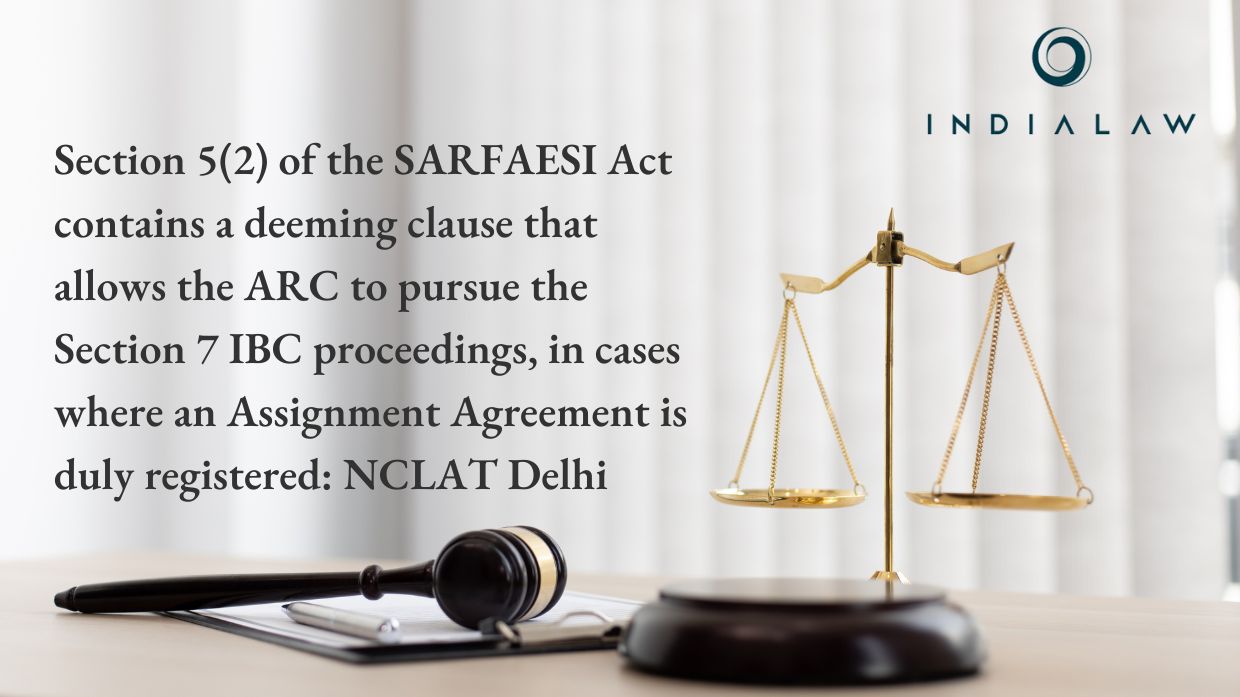Section 5(2) of the SARFAESI Act contains a deeming clause that allows the ARC to pursue the Section 7 IBC proceedings, in cases where an Assignment Agreement is duly registered: NCLAT Delhi

In the case of Emta Coal Ltd. v. L&T Finance Ltd. and Anr., the National Company Appellate Tribunal vide Order dated 28.05.2024 held that when debt assignment is registered without raising any objections regarding inadequacy of the stamp, by virtue of Section 5(2) of SARFAESI Act, 2002, an Asset Reconstruction Company is entitled to prosecute a Section 7 Company Petition.
Table of Contents
Brief Facts of the Case
A Section 7 Company Petition under the Insolvency and Bankruptcy Code (IBC) had been filed by L&T Finance Ltd. (Respondent No. 1) on 27.01.2020. During the pendency of the Application, the debt was assigned to Phoenix Asset Reconstruction Company Pvt. Ltd. (Respondent No. 2) by virtue of an Assignment Agreement dated 29.03.2022. Respondent No. 2 then filed an Interlocutory Application bearing IA No. 504/2022 before the NCLT Kolkata praying of its substitution in place of Respondent No. 1. The Corporate Debtor subsequently filed an IA 1371/2023 seeking directions to Respondent No.1 to produce the original Assignment Agreement and to impound the original Agreement. The Hon’ble NCLT dismissed the IA 1371/2023 and allowed Respondent No. 2’s substitution under IA No. 504/2022.
The present Appeal is filed by Emta Coal Ltd. (the Corporate Debtor) challenging an Order dated 04.04.2024 passed by the NCLT Kolkata Bench in IA 504/KB/2022 and IA 1371/KB/2023.
Contentions of the Parties
The Counsel for the Appellant contended that the Assignment Agreement dated 29.03.2022 is not duly stamped under the Maharashtra Stamp Duty act, 1958, thereby cannot be admitted and the Adjudicatory Authority has committed an error relying on the Agreement while permitting the substitution. The Appellant relied on Section 35 of the Indian Stamp Act, and submitted that no document which is not adequately stamped can be received in evidence. Further it was contended that exemption provided to Assignment Agreements under Section 5(1A) of the SARFEASI Act is not applicable to the State of Maharashtra as the notification which granted such exemption was withdrawn by Government order dated 26.08.2005. Hence, for Assignment Agreement, stamp duty as is required to be paid under the Maharashtra Stamp Act, 1958 is required to be paid.
The Counsel for the Respondents contended that Assignment Agreement dated 29.03.202 is a registered document and there is presumption under law that registered documents are duly stamped. Secondly, the Counsel relied on the provisions of SARFAESI Act, 2002 which empowers an Asset Reconstruction Company to continue prosecution of a Section 7 Application pending by the financial creditor. In order to substantiate their arguments, the Counsel for the Respondents also relied on the case of Pawan Kumar Manguturam Bairagra vs Encore Assets Reconstruction Company ltd. (Company Appeal (AT) (Insolvency) No. 701 of 2023.
Decision of the NCLAT
The Appellate Tribunal underscored the provisions of Section 5 of the SARFAESI Act, 2002, which empower an Asset Reconstruction Company (ARC) to acquire financial assets from any bank or financial institution through the issuance of bonds or via an agreement. This provision also permits the ARC to file for substitution of the lender bank or institution with itself.
In its ruling, the Hon’ble NCLAT highlighted Section 5(2) of the SARFAESI Act, which contains a deeming clause. According to this clause, once an ARC acquires the financial assets, it is deemed to be the lender, and all the rights of the original bank or financial institution vest in the ARC.
The Tribunal relied on the case of Pawan Kumar Manguturam Bairagra[1] wherein it was held that Section 5 of the SARFAESI Act has an overriding effect by virtue of which an ARC may acquire financial assets of any bank or financial institution and by virtue of Section 5 (2), the ARC shall be deemed to be a lender.
Further, while considering the meaning of deeming clause, the Tribunal relied on the Hon’ble Supreme Court’s opinion in the case of Anuj Jain, Interim Resolution Professional for Jaypee Infratech Limited vs Axis Bank Ltd. & Ors.[2], where the Hon’ble Court reiterated settled principles with regards to a deeming fiction and held that, “If you are bidden to treat an imaginary state of affairs as real, you must surely, unless prohibited from doing so, also imagine as real the consequences and incidents which, if the putative state of affairs had in fact existed, must inevitably have flowed from or accompanied it…” The Apex Court concluded that while the word ‘deemed’ serves various functions depending on the context, one of its main purposes is to consider something as real, even if it might not be, thereby necessitating that the subject be treated as if it were actual.
While considering the argument that the Assignment Agreement is not duly stamped as per the Maharashtra Stamp Act, the Tribunal held that when a document is presented before a Registering Authority for registration, the Authority must satisfy itself with regard to the Stamp duty paid on the document. If the Authority has doubts regarding the same, it may send the document to the Collector for determining the deficiency. The Tribunal noted that in the present case, no objections were raised by the Registering Authority and thus, the document was duly stamped.
The Tribunal concluded that there no was dispute between the parties that the Assignment Agreement is a registered document and upheld the decision of the Hon’ble NCLT that Phoenix ARC Pvt Ltd. is entitled to prosecute the Section 7 Application. Accordingly, the Appeal was dismissed.
[1] Pawan Kumar Manguturam Bairagra vs Encore Assets Reconstruction Company ltd. (Company Appeal (AT) (Insolvency) No. 701 of 2023.
[2] MANU/SC/0228/2020; (2020) 8 SCC 401
By entering the email address you agree to our Privacy Policy.



